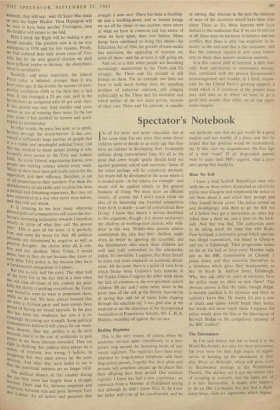Notebook Spectator's
1 'N1 all for more and better education, but at I the same time I'm not sorry that some clever children seem to decide at an early age that they have no interest in developing their formidable abilities along conventional lines. It's all to the good that some bright sparks should hold out against grammar school and university. Some of the talent perhaps will lie completely dormant, but much will be developed in the areas where it is needed most—in the unions, for example—and much will be applied simply to the general business of living. We must have an efficient society, of course, but I don't much relish the idea of its becoming one frenzied competition from birth to death—a sort of universalised Bow Group. I know that there's a serious drawback to this argument, though: it is almost exclusively the children of working-class parents who with- draw in this way. Middle-class parents seldom contemplate the idea that their children might often do better by ignoring the scramble; and the headmasters who teach these children are well and truly committed to the scholarship stakes. It's inevitable, I suppose, that there should be more and more emphasis on academic attain- ment. All the same, there is a point of view from which Dame Anne Godwin's testy remarks at the Trades Union Congress the other week about the lack of attention to the non-grammar-school children (80 per cent.) seem rather more to the point than all the talk at the British Association of saving that odd bit of talent from slipping through the selection net. I was glad also at the weekend to see the chairman of the Incorporated Association of Preparatory Schools, Mr. L. H. A. Hankey. sounding off against the rat-race.










































 Previous page
Previous page